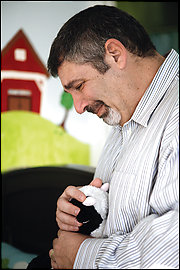
(Photo by Rebecca Drobis)
I started reading Gene Weingarten’s “Fatal Distraction” in March 2009. I didn’t get to the final page until yesterday.
My first attempt to read the story stopped at page six. I couldn’t bring myself to finish it. “Fatal Distraction” is about people whose children die after being forgotten and left in cars, something that happens 15 to 25 times a year in America. I had a 11-month-old baby at the time I first tried to read this piece, and the story — which would go on to win the Pulitzer Prize for Feature Writing in 2010 — was so tragic and devastating, I had to set it aside until it didn’t feel so close to home.
Gene Weingarten is one of my favorite writers. He’s talented and versatile: a humorist, a master of feature writing, and the author of the best personal profile I’ve ever read, “The Peekaboo Paradox.” He can write short. He can write long. He can make you laugh or make you cry.
And then he writes something like this, which doesn’t really fit into any clear category. The story is nearly 9000 words, a sweeping look at the tragedy of men and women who left their kids to die in cars. His story isn’t judgmental, but it also hides nothing from the reader, providing graphic descriptions of what the children suffered and how they were found. He profiles several parents who made these horrible mistakes and looks at how society and our legal system deals with them:
The charge in the courtroom was manslaughter, brought by the Commonwealth of Virginia. No significant facts were in dispute. Miles Harrison, 49, was an amiable person, a diligent businessman and a doting, conscientious father until the day last summer — beset by problems at work, making call after call on his cellphone — he forgot to drop his son, Chase, at day care. The toddler slowly sweltered to death, strapped into a car seat for nearly nine hours in an office parking lot in Herndon in the blistering heat of July.
It was an inexplicable, inexcusable mistake, but was it a crime? That was the question for a judge to decide.
At one point, during a recess, Harrison rose unsteadily to his feet, turned to leave the courtroom and saw, as if for the first time, that there were people witnessing his disgrace. The big man’s eyes lowered. He swayed a little until someone steadied him, and then he gasped out in a keening falsetto: “My poor baby!”
A group of middle-schoolers filed into the room for a scheduled class trip to the courthouse. The teacher clearly hadn’t expected this; within a few minutes, the wide-eyed kids were hustled back out.
Weingarten zooms in close on a few individuals like this, men and women who made these devastating errors, but he also tries to explain how this can happen. Weingarten pulls back the lens and shows that this isn’t just one tragic story; it’s a pattern:
Two decades ago, this was relatively rare. But in the early 1990s, car-safety experts declared that passenger-side front airbags could kill children, and they recommended that child seats be moved to the back of the car; then, for even more safety for the very young, that the baby seats be pivoted to face the rear. If few foresaw the tragic consequence of the lessened visibility of the child . . . well, who can blame them? What kind of person forgets a baby?
The wealthy do, it turns out. And the poor, and the middle class. Parents of all ages and ethnicities do it. Mothers are just as likely to do it as fathers. It happens to the chronically absent-minded and to the fanatically organized, to the college-educated and to the marginally literate. In the last 10 years, it has happened to a dentist. A postal clerk. A social worker. A police officer. An accountant. A soldier. A paralegal. An electrician. A Protestant clergyman. A rabbinical student. A nurse. A construction worker. An assistant principal. It happened to a mental health counselor, a college professor and a pizza chef. It happened to a pediatrician. It happened to a rocket scientist.
Last year it happened three times in one day, the worst day so far in the worst year so far in a phenomenon that gives no sign of abating.
One thing that makes this story so effective and powerful is its scope. Weingarten moves back and forth between the personal stories and the larger question of how these tragedies happen. He also looks at public reactions to these events. He reports on technologies and reforms that might prevent similar tragedies in the future. Research, interviews, and first-person observations give this story tremendous depth.
Weingarten takes his time, holding back judgment and asking more questions than he answers. The story overflows with tragedy, but also a few glimmers of hope and humanity. He doesn’t try to soften the story with sentimentality, but he hints that it is possible for some good to emerge from the aftermath of unthinkable tragedy.
This is a very tough read, but it is a tremendous example of the best work in longform nonfiction.
2 responses to ““Fatal Distraction” (31 Longreads in 31 Days, Day Four)”
Oh my God. Thank you for sharing this…I guess. I kind of want to read it, and kind of don’t. But your review is superb, as is your idea to do this in December. As soon as I finish classes, I’m going to come back and peruse your other offerings. Wonderful idea!
Thanks Melanie… You’re exactly right. It’s one of the best nonfiction stories I’ve read. It’s also one of the toughest to read. Part of what makes it so strong is that Weingarten handles such a difficult, painful subject with fairness and respect, without glossing over the horror of what happened.